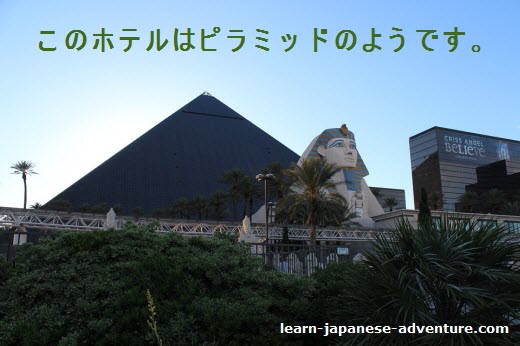- Home
- Intermediate Lessons
- Japanese Expression you desu
Japanese Expression you desu (ようです) -
Intermediate Lessons: 23
In this lesson, you will get to learn another Japanese expression - ようです (you desu).
Some people may mixed up this expression with そうです (sou desu), or 目の"そう" (me no "sou"), which you have learned in lesson 19. However, they are two different expressions.
When the look of a thing leads you to make a guess, you state your guess using 目の"そう" (me no "sou"). You make the guess after looking at the appearance of a thing although it has not confirmed for a fact.
Japanese expression ようです (you desu) conveys the speaker's subjective conjecture, which is based on the information obtained through his or her sensory organs.
The difference between these two expressions will be explained further using some examples.
Sentence Patterns
As usual, let's check out the sentence patterns first...
| Verb | plain-form | ようです |
| い-adj | plain-form | ようです |
| な-adj | plain-form(~ |
ようです |
| Noun | plain-form(~ |
ようです |
Let's see how to use ようです (you desu) with an example...
- 交差点に人が大勢集まっていますね。事故のようです。
kousaten ni hito ga oozei atsumatte imasu ne. jiko no you desu
Meaning: There is a big crowd at the cross junction. It looks like there's an accident.
Based on the big crowd that you saw at the cross junction, you deduced that there's been an accident.
Using with Adverb どうも (doumo)
Sometimes you might want to begin your ようです (you desu) sentence with the adverb どうも (doumo) which suggests you cannot be certain if what you are saying is a fact. For example...
- 咳も出るし、頭も痛いです。どうも風邪をひいたようです。
seki mo deru shi, atama mo itai desu. doumo kaze wo hiita you desu
Meaning: I have a cough and a headache. It seems like I have caught a cold.
More Examples on Japanese Expression ようです (you desu)
|
1. |
道が濡れています。雨が降ったようです。 |
|
2. |
アランさんはずっと勉強していますね。宿題がたくさんあるようです。 |
|
3. |
あのレストランはいつも込んでいます。料理はおいしいようです。 |
|
4. |
事務所の電気が消えています。誰もいないようです。 |
|
5. |
田中さんは魚を食べません。嫌いなようです。 |
|
6. |
時計が今朝から動きません。故障のようです。 |
|
7. |
山田さんは病院に行きました。病気のようです。 |
Difference Between そうです (sou desu) and ようです (you desu)
It's common that people get confused between そうです (sou desu) and ようです (you desu). Let's use an example to differentiate this two Japanese expressions.
|
1. |
先生はどこに行っても急いで歩いています。忙しそうです。 |
|
2. |
先生は事務室にいません。でもテーブルの上に沢山の書類が置いてあります。忙しいようです。 |
In example 1, it indicates an intuitive judgement based on what you have seen of your teacher's condition or behaviour.
In example 2, it indicates your judgement based on what you have seen, read, heard or been told about your teacher.
The important distinction is not the sense which is being used, but rather that the former is based on direct observation and the latter is based on inference.
Another Function for Japanese Expression Noun のようです
Sometimes you can use Noun のようです (Noun no you desu) to describe something by using thing similar to it. It's often used in the following sentence pattern...
Topic は Noun のようです

For example, if you want to describe a hotel you saw in the newspaper, you can say...
- このホテルはピラミッドのようです。
kono hoteru wa piramiddo no you desu
Meaning: This hotel is similar to pyramid.
It will be difficult to describe the shape of the hotel. But if you describe it as similar to the pyramid, it becomes easy to understand. Let's see one more example...
- あの人の髪はライオンのようです。
ano hito no kami wa raion no you desu
Meaning: That person's hair is similar to that of a lion.
Again, it's not easy to describe a person's hair. But if you say it looks similar to that of a lion, immediately people can imagine the image of that person's hair and understand your description.
More Examples for Topic は Noun のようです
|
1. |
この帽子はサンタクロースのようです。 |
|
2. |
赤ちゃんの頬はりんごのようです。 |
|
3. |
山田さんの髪の色はトマトのようです。 |
Japanese Expressions Noun のような and Noun のように
In addition to Noun のようです (Noun no you desu), it can also be modified to get the noun-adjective phrase - Noun のような (Noun no you na) and the adverbial phrase - Noun のように (Noun no you ni).
The sentence patterns are as follow...
| Noun のような | Noun |
| Noun のように | Verb/Adjective |
When you want to describe one particular noun, you can use Noun のような Noun (Noun no you na Noun). Using the previous examples...
|
1. |
このホテルはピラミッドのような形をしています。 |
|
2. |
あの男の子はサンタクロースのような帽子をかぶっています。 |
|
3. |
あの人はライオンのような髪をしています。 |
|
4. |
赤ちゃんはりんごのような頬をしています。 |
|
5. |
山田さんの髪はトマトのような色をしています。 |
When you want to describe somebody's action or describe the adjective, use this Japanese expression Noun のように Verb/Adjective (Noun no you ni Verb/Adjective).
For example, if you want to describe how good a man is at swimming, you can say this...
- あの男の人は魚のように泳いでいます。
ano otoko no hito wa sakana no you ni oyoide imasu
Meaning: That man swims like a fish.
You can describe in many ways how good or how fast the man can swim. But the best way to describe is he swims like a fish. People will then know how good he is at swimming.
Similarly, you can describe in many ways how cold the water is. But the best way to describe is that the coldness is similar to that of the ice. Then people can get the idea of how cold it is.
- この水は氷のように冷たいです。
kono mizu wa koori no you ni tsumetai desu
Meaning: This water is as cold as ice.
More Examples on Japanese Expression Noun のように
|
1. |
この教室は図書館のように静かです。 |
|
2. |
私は日本人のように日本語を上手に話したいです。 |
|
3. |
弟は猿のように上手に木に登れます。 |
|
4. |
私は鳥のように空を飛びたいです。 |
Related Page
Lesson 19: Japanese Expression sou desu (そうです), or 目の"そう" (me no "sou").
Best Deal of the Year! Get 68% OFF Lifetime Premium! Ends on 13 Dec 2025
Click Here to Get 68% OFF Lifetime Premium and be on the fast track to fluency in Japanese.
The link above is an affiliate link, which means that I would earn a commission (at no extra cost to you) if you do end up purchasing the related learning course.
Buy me a coffee









Facebook Comments
Don’t see the comments box? Log in to your Facebook account, give Facebook consent, then return to this page and refresh it.